“Whenever I start saving so that I expand my business, somethings comes up and I use all of my money” said a sole proprietor.
How many times have we been in such situation? We have set aside a fraction of our income for our children’s education, our business expansion or our holiday plan but the goals fall short from a medical bill, our consumption habits and many other reasons best known to you.
We are often castigated for having a poor saving culture and some say we “lack saving discipline”. Our recent household survey The Saving Cultureprovides us with holistic insights about a large percentage of Kenyans who are at the crossroad between saving for future activities or living through the day.
The insights covers major thematic areas which informs a decision to either save or consume.
Project: www.poll.co.ke
Survey Number: 2
Number of Respondents: 220
First, let us review our decision to save based on a random sample of the Kenyan population selected from 47 counties of Kenya. 81.4% of the respondents save money compared to 18.6% who generally don’t
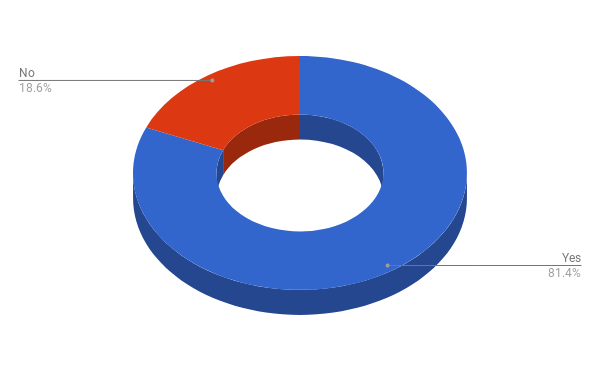
What factors affect an individual’s decision to save or not save?
This question leads me to our second insight. Monthly income and expenditure. According to Keynesian economics Kenyan marginal propensity (resulting from small increase of income and tendency) to save is lower than its marginal propensity to consume. In other words, an increase in one unit of income is consumed rather than saved. A unit increase of income for lower income earners will not cause a significant change in their saving habits. In fact they will cut on their savings and use them to upgrade their lifestyles, investment and other consumption activities, as expressed below:
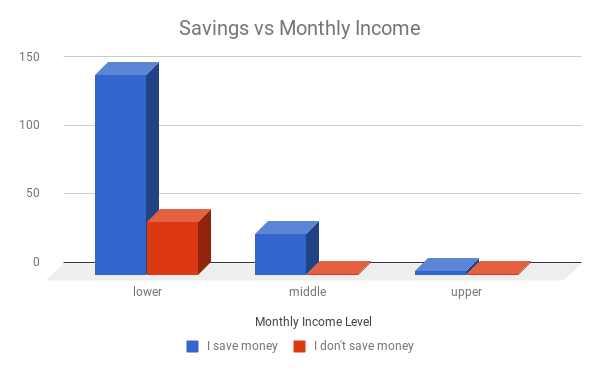
It is interesting to note that over 50% of the lower income earners save. They responded Yes to saving as compared to less than half of those who did not save.
How or where do they earn their income?
Our third insight answers this question. 26.3% of the respondents work in the informal sector while only 20.5% are employed as compare to 29.4% who are unemployed or self-employed.
This tells us more about their lower income level and their saving culture. That is those who work in informal sectors, unemployed and self-employed have lower income levels and their saving habits tends to change when their income increases. They save less when their income changes from lower to middle or higher income.
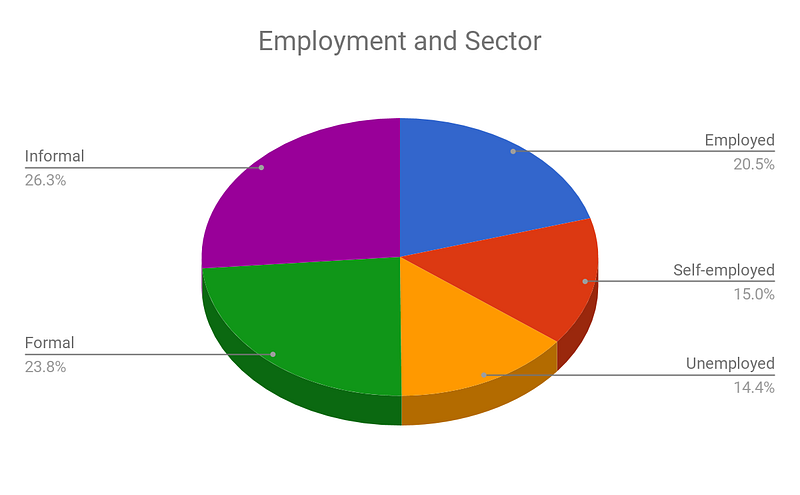
Allow me to bring the age and marital status as factors in this conversation. Does age affect Kenyans savings habits?
The obvious answer is yes but how? 93.9% of the young adults between age 18 and 35 save as compared to 6.1% of the middle aged and adults who are over 36 years of age.
Majority of these group of young adults have regular saving accounts, they are single and this imply they have little or no family responsibility.
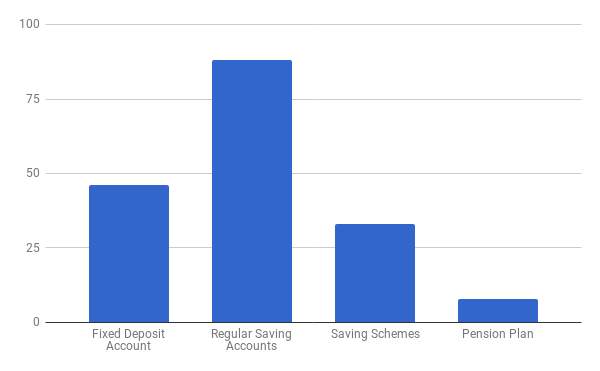
81.4% of the the population who save are singles.
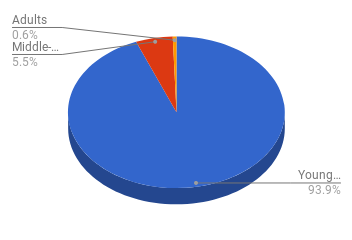

Lastly, the final analysis is on the education. Over 75% of the population that saves, has a university or college degree. The level of education enhances and emphasises the importance of saving. That is why majority of those who are educated have a savings plan.
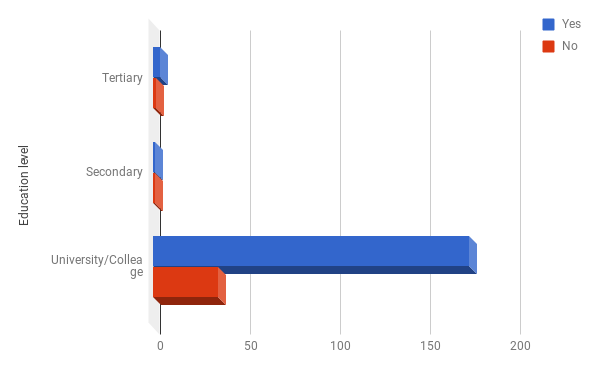
This is where majority of the respondents save their money.
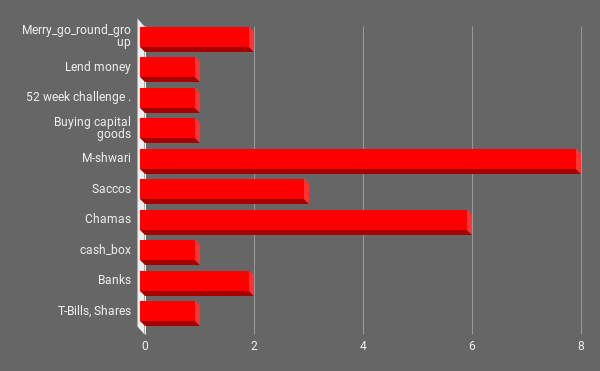
In conclusion, we all need money and many of us feel we don’t have enough of it. It is important we set aside a fraction of our income in our saving accounts irrespective of the size of our income, our age group, marital status and our education level.

child teen
buying prescription drugs in mexico online: mexican pharmacy online – best online pharmacies in mexico
child porn
Very good information can be found on web site.Blog monetyze
cheapest online pharmacy india: buy medicines online in india – indian pharmacy paypal
canadian pharmacy cheap: the canadian pharmacy – certified canadian international pharmacy
india pharmacy mail order: mail order pharmacy india – pharmacy website india
http://foruspharma.com/# pharmacies in mexico that ship to usa
rate canadian pharmacies canadian pharmacy antibiotics buying from canadian pharmacies
buying prescription drugs in mexico: mexico pharmacy – mexican drugstore online
best online pharmacies in mexico: mexico pharmacy – mexican pharmaceuticals online
https://canadapharmast.com/# canada pharmacy
mexican mail order pharmacies: mexico drug stores pharmacies – mexico drug stores pharmacies
pharmacy website india best india pharmacy online shopping pharmacy india
canadian pharmacy world: best rated canadian pharmacy – reputable canadian pharmacy
buying prescription drugs in mexico online: mexican border pharmacies shipping to usa – mexican drugstore online
india online pharmacy: indian pharmacy paypal – mail order pharmacy india
mexican rx online mexico drug stores pharmacies reputable mexican pharmacies online
india pharmacy mail order: Online medicine order – online shopping pharmacy india
https://canadapharmast.online/# buying drugs from canada
buy prescription drugs from india buy prescription drugs from india online shopping pharmacy india
purple pharmacy mexico price list: medication from mexico pharmacy – purple pharmacy mexico price list
medicine in mexico pharmacies: mexico drug stores pharmacies – mexican rx online
https://indiapharmast.com/# Online medicine home delivery
mexican border pharmacies shipping to usa: buying prescription drugs in mexico – mexican border pharmacies shipping to usa
buying prescription drugs in mexico online: mexican rx online – best online pharmacies in mexico
buying from online mexican pharmacy: mexican pharmacy – reputable mexican pharmacies online
mexico pharmacy п»їbest mexican online pharmacies mexican pharmacy
buy prescription drugs from india: online shopping pharmacy india – best india pharmacy
escrow pharmacy canada canadian drug pharmacy buy drugs from canada
https://canadapharmast.online/# prescription drugs canada buy online
certified canadian international pharmacy: best online canadian pharmacy – pharmacy canadian superstore
mail order pharmacy india: mail order pharmacy india – online shopping pharmacy india
india pharmacy mail order: best online pharmacy india – india pharmacy
pharmacies in canada that ship to the us: canadian pharmacy antibiotics – canadian pharmacy oxycodone
https://indiapharmast.com/# india pharmacy
indian pharmacy online indian pharmacy online india online pharmacy
best canadian online pharmacy: best canadian pharmacy – buy drugs from canada
pet meds without vet prescription canada: canadian discount pharmacy – canadian pharmacy 24h com
safe canadian pharmacy: northwest pharmacy canada – best canadian online pharmacy
https://ciprodelivery.pro/# ciprofloxacin 500 mg tablet price
http://ciprodelivery.pro/# buy cipro
amoxicillin for sale online: purchase amoxicillin 500 mg – amoxicillin 500mg capsule
paxlovid buy: paxlovid for sale – paxlovid india
http://paxloviddelivery.pro/# paxlovid india
https://clomiddelivery.pro/# can i purchase generic clomid pills
Respect to post author, some great selective information.
canadian pharmacy amoxicillin: buy amoxicillin 500mg canada – buy amoxicillin from canada
https://ciprodelivery.pro/# buy ciprofloxacin
http://amoxildelivery.pro/# amoxicillin 825 mg
paxlovid generic: paxlovid buy – paxlovid cost without insurance
https://paxloviddelivery.pro/# Paxlovid buy online
https://ciprodelivery.pro/# buy cipro online
ampicillin amoxicillin: amoxicillin 500mg price canada – where to buy amoxicillin pharmacy
https://doxycyclinedelivery.pro/# doxycycline prices canada
https://clomiddelivery.pro/# cheap clomid
ciprofloxacin generic: buy ciprofloxacin – buy cipro online canada
https://doxycyclinedelivery.pro/# doxycycline 500mg
https://amoxildelivery.pro/# buy amoxicillin 500mg
ciprofloxacin generic: ciprofloxacin 500 mg tablet price – п»їcipro generic
doxycycline tablets in india: doxycycline 600 mg – generic doxycycline
https://amoxildelivery.pro/# buy amoxicillin online without prescription
https://ciprodelivery.pro/# buy ciprofloxacin
paxlovid pharmacy: paxlovid india – paxlovid pharmacy
https://doxycyclinedelivery.pro/# doxycycline 75 mg price
https://amoxildelivery.pro/# amoxicillin cost australia
buy amoxicillin canada: amoxicillin 500mg – amoxicillin 500 capsule
https://paxloviddelivery.pro/# Paxlovid buy online
https://paxloviddelivery.pro/# paxlovid buy
doxycycline 100mg capsules price: doxycycline cap price – canadian pharmacy doxycycline
amoxicillin azithromycin: order amoxicillin online no prescription – amoxicillin 500 coupon
average price of doxycycline: doxycycline 75 mg capsules – doxycycline price australia
doxycycline 100mg price 1mg: doxycycline 100mg tablets cost – buy doxycycline pills online